基于多维特征提取网络模型和变压器模块的青苹果检测方法。
IF 2.8
4区 农林科学
Q3 BIOTECHNOLOGY & APPLIED MICROBIOLOGY
引用次数: 0
摘要
为提高无公害青苹果检测的快速性和准确性,保障食品安全,本文以 DETR 网络为框架,提出了一种基于多维特征提取网络和 Transformer 模块的无公害青苹果检测新方法。首先,改进的 DETR 网络主特征提取模块采用 ResNet18 网络,并将部分残差层替换为可变形卷积(DCNv2),使模型能更好地适应无公害水果在不同尺度和角度的变化,同时消除了微生物污染对水果检测的影响;随后,集成了扩展空间金字塔池化模型(DSPP)和多尺度残差聚合模块(FRAM),有助于降低特征提取过程中的特征噪声,最大限度地减少底层特征的损失。两个模块的融合增强了模型对不同尺度物体的检测能力,从而提高了近色水果检测的准确性;同时,为了解决基础网络模型收敛速度慢、计算量大的问题,通过替换 Transformer 的注意力机制,提高了整体网络模型的收敛速度。实验结果表明,与原有的 DETR 模型相比,所提出的算法在 AP、AP50 和 AP75 指标上都有所改进,尤其是在 AP50 指标上的改进最为明显,检测精度达到 97.12%。同时,将训练好的网络模型部署到拣选机器人上。与原来的 DETR 网络模型相比,其平均检测精度高达 96.58%,检测速度提高了约 51%。在模型部署前后进行了混合样本检测测试,所提出的方法对无污染水果的检测率达到了 0.95 以上,使采摘机器人能够高效地完成青苹果的采摘任务。测试结果表明,本文提出的算法在采摘机器人检测无污染近色水果的任务中表现出巨大的潜力。它确保了无公害水果的采摘和人工智能在食品安全领域的应用。本文章由计算机程序翻译,如有差异,请以英文原文为准。
Green Apple Detection Method Based on Multidimensional Feature Extraction Network Model and Transformer Module
To enhance the fast and accurate detection of pollution-free green apples for food safety, this paper uses the DETR network as a framework to propose a new method for pollution-free green apple detection based on a multidimensional feature extraction network and Transformer module. Firstly, an improved DETR network main feature extraction module adopts the ResNet18 network and replaces some residual layers with deformable convolutions (DCNv2), enabling the model to better adapt to pollution-free fruit changes at different scales and angles, while eliminating the impact of microbial contamination on fruit testing; Subsequently, the extended spatial pyramid pooling model (DSPP) and multiscale residual aggregation module (FRAM) are integrated, which help reduce feature noise and minimize the loss of underlying features during the feature extraction process. The fusion of the two modules enhances the model’s ability to detect objects of different scales, thereby improving the accuracy of near-color fruit detection. At the same time, in order to solve the problems of slow convergence speed and large calculation amount of the basic network model, the convergence speed of the overall network model is improved by replacing the attention mechanism of Transformer. Experimental results show that compared with the original DETR model, the proposed algorithm has improved in AP, AP50, and AP75 indicators, especially in the AP50 indicator, which has the most obvious improvement reaching a detection accuracy of 97.12%. In the meantime, the trained network model is deployed on the picking robot. Compared with the original DETR network model, its average detection accuracy is as high as 96.58%, and the detection speed is increased by about 51%. Mixed sample detection tests were carried out before and after the model deployment, and the detection rate of the proposed method for nonpolluted fruits reached more than 0.95. enabling the picking robot to efficiently complete the task of picking green apples. The test results show that the algorithm proposed in this article exhibits great potential in the task of detecting pollution-free near-color fruits by the picking robot. It ensures pollution-free fruit picking and the application of AI in food safety.
求助全文
通过发布文献求助,成功后即可免费获取论文全文。
去求助
来源期刊

Journal of food protection
工程技术-生物工程与应用微生物
CiteScore
4.20
自引率
5.00%
发文量
296
审稿时长
2.5 months
期刊介绍:
The Journal of Food Protection® (JFP) is an international, monthly scientific journal in the English language published by the International Association for Food Protection (IAFP). JFP publishes research and review articles on all aspects of food protection and safety. Major emphases of JFP are placed on studies dealing with:
Tracking, detecting (including traditional, molecular, and real-time), inactivating, and controlling food-related hazards, including microorganisms (including antibiotic resistance), microbial (mycotoxins, seafood toxins) and non-microbial toxins (heavy metals, pesticides, veterinary drug residues, migrants from food packaging, and processing contaminants), allergens and pests (insects, rodents) in human food, pet food and animal feed throughout the food chain;
Microbiological food quality and traditional/novel methods to assay microbiological food quality;
Prevention of food-related hazards and food spoilage through food preservatives and thermal/non-thermal processes, including process validation;
Food fermentations and food-related probiotics;
Safe food handling practices during pre-harvest, harvest, post-harvest, distribution and consumption, including food safety education for retailers, foodservice, and consumers;
Risk assessments for food-related hazards;
Economic impact of food-related hazards, foodborne illness, food loss, food spoilage, and adulterated foods;
Food fraud, food authentication, food defense, and foodborne disease outbreak investigations.
 求助内容:
求助内容: 应助结果提醒方式:
应助结果提醒方式:


